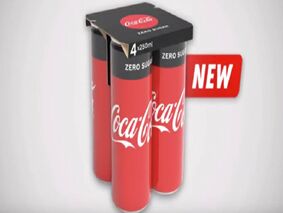可口可乐推出环保的新型纸包装
|
Plastic pollution has become one of the most pressing problems of the 21st Century with plastic waste becoming near ubiquitous. It is estimated that just in 2016, the world produced over 320 million tons of plastic, and this number is set to double by 2034. Plastic waste even makes its way into our oceans with 8 million pieces of plastic pollution per day polluting our waters and destroying the habitat for hundreds of species. It is now believed that there may be around 5.25 trillion pieces of plastic in the ocean weighing in total up to 269,000 tonnes.
It's been crystal clear for a long time that the situation is dire and something needs to be done, and fast. Luckily, Coca-Cola stepped up to the challenge and came up with one innovative and rather effective solution. The firm is replacing its plastic wrapping in Europe with a new paper board technology. This new tech is called the KeelClip and it is a first for the non-alcohol ready-to-drink (NARTD) industry. The innovative solution is a result of the joint initiative between Coca‑Cola and its strategic bottling partners Coca‑Cola HBC and Coca‑Cola European Partners. Using KeelClips, Coca-Cola aims to remove all plastic wrap from its can multipacks in all European Union markets by the end of 2021. The firm is optimistic that the move will save 2,000 tons of plastic and 3,000 tons of CO2 annually. "Innovation is a key principle of our sustainable packaging work and the application of this fully recyclable paperboard KeelClip™, which comprises a top board that the cans clip into and a central cardboard 'keel' - similar to a ship's keel - that stabilizes the pack, is another example of how we are delivering on our commitment to remove all unnecessary and hard to recycle single-use plastic from our products," said Joe Franses, Vice President, Sustainability at Coca‑Cola European Partners. We are loving this eco-friendly initiative and we're hoping that it won't be too long before other companies adopt a similarly conscious approach to tackling plastic pollution. |









